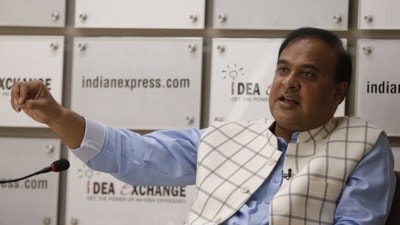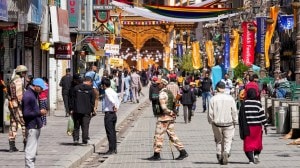A Poster in the corner details the kind of “rahasyamayi ghantnaavan (mysterious incidents)” that are treated at this ‘mental health awareness centre’ on Kotakapura Road in Faridkot — everything from “dandal daurey paina tey behosh hona (getting fits and strokes, and fainting) to upari asar aana (possessed by spirits).”

Tarksheel Society, founded 29 years ago, gets surprised by little. “In the end, all of these turn out to be man-made acts,” smiles Channan Singh Wander, 55.
Story continues below this ad
On this Sunday, there are three-four people waiting to see him. A small TV in the waiting room is showing a video of a Tarksheel activist listing facts to show that astrological predictions have no scientific basis — “People with different kundlis die with hundreds of others in an accident,” the activist points out.
On the table lie books and pamphlets published by the Tarksheel Society, including one with the title Bhootan di Baraat (Bal Kahaniyaan)’. The title, meaning ‘wedding procession of ghosts’, is meant to dissipate the air of mystery surrounding supernatural elements, explains Wander.
Tarksheel takes its inspiration from Abraham Kovoor, an Indian professor and rationalist based in Sri Lanka, known for his work in exposing Indian and Sri Lankan ‘godmen’ and their paranormal activities. After Kovoor’s books Begone Godmen and Gods, Demons and Spirits, which he translated into Punjabi, did well in the state, Megh Raj Mitter founded Tarksheel.
It has almost 70 units in Punjab now, each with at least 10 members. The Ludhiana and Barnala centres deal specifically with mental conditions. The society receives no government funding, and depends entirely on donations. A van of the Tarksheel Society also tours the state selling books on rationalism.
Story continues below this ad
A 25-year-old B.Com student is the first patient this Sunday. His mother tells Wander that he has stopped attending college and has stopped smiling. Her fear is that her son is under the influence of some spirits. Wander asks the youth to lie down. “He has been made to believe that ghosts exist. We will have to fill his mind with positivity. This can be done only when he is subconscious,” says Wander as he prepares to hypnotise the 25-year-old.
Wander says they use hypnosis or counselling only in case of patients who, they think, can get better through “positive reinforcement”. The serious cases are referred to psychiatrists.
The next patient is a 43-year old from Moga, who says that when he sleeps at night, he hears a man crying, who later tugs him by the hand. “My wife sees my hand shaking and that man speaks to me,” he says.
After half an hour of counselling, the man confesses he is a liquor addict. “The day I do not drink liquor, this does not happen,” he admits to Wander.
Story continues below this ad
Originally a veterinary officer, Wander says he remembers the day he decided to make science his vocation. “We were taught in school that Lord Hanuman swallowed the Sun. How could Hanuman have swallowed the Sun, when science says that Sun is bigger than Earth, I thought.”
Police are not always cooperative, says Jaswant Singh, secretary of Tarksheel’s Ludhiana branch. “In the case of tantriks, an FIR is registered but he is often let off. In some cases, police refuse to register an FIR.”
Apart from carrying forward the work of Kovoor, there is another practice the rationalist started that Tarksheel has continued. In 1963, Kovoor announced an award of Rs 1 lakh for anyone who could demonstrate supernatural powers under foolproof and “fraud-proof” conditions. Tarksheel now promises “a cash prize of Rs 5 lakh”.
There has been no winner so far.

 A session on mental health at Tarksheel’s Faridkot centre. (Source: Express photo by Gurmeet Singh)
A session on mental health at Tarksheel’s Faridkot centre. (Source: Express photo by Gurmeet Singh)






